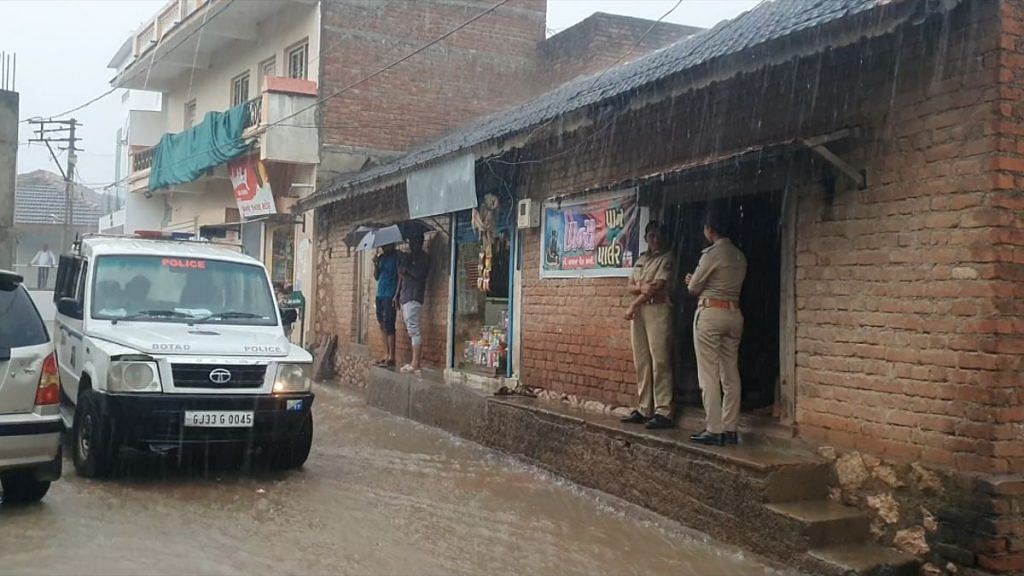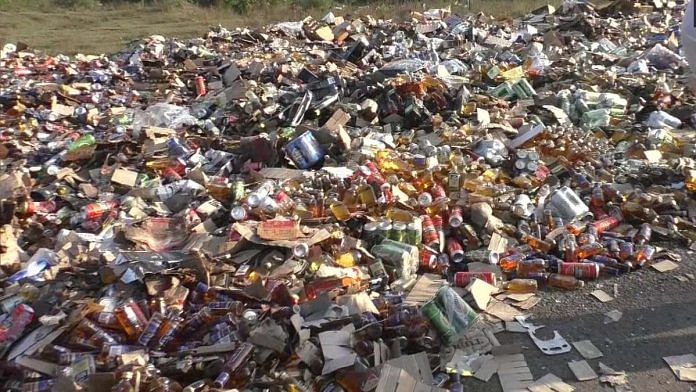Ahmedabad: A bad batch of ‘illicit’ liquor killed 125 people in Baroda. In Ahmedabad, the death toll was reportedly more than 150. In Botad district and Ahmedabad’s Dhandhuka municipality, it was 42 villagers. The first incident took place in 1989, the second in 2009, and the third one last week.
Each of these incidents, decades apart, threw the spotlight on the same old problem in Gujarat: prohibition has not stopped people from drinking. On top of that, it has led to a burgeoning underground industry in the manufacturing and trade of liquor, allegedly with police personnel and politicians often in cahoots.
It’s an open secret: rich or poor, upper-caste or not, alcohol is within reach for all in Gujarat.
In a written reply in the Gujarat legislative assembly in March, for instance, the state government said in the past two years alone, liquor worth Rs 235 crore was seized by the authorities. The haul included one crore bottles of Indian made foreign liquor (IMFL), 19 lakh bottles of country-made booze, and 12 lakh bottles of beer.
In the wake of last week’s liquor deaths, the Gujarat Police have made at least 15 arrests and conducted several raids. And the whip has fallen on the police, too. The district superintendents of police (DSPs) of Botad and Ahmedabad Rural were transferred,and at least six police officers were suspended for alleged dereliction of duty.
Yet experts say that, as has been the pattern for decades, the crackdowns fail to address the issues brought on by prohibition itself, especially for the poor and marginalised sections of society affected by so-called ‘hooch tragedies’.
Vidyut Joshi, a sociologist and professor emeritus at Gujarat Vidyapith in Ahmedabad, told ThePrint: “Socially, the business class of Gujarat holds values of abstinence and eating vegetarian food. Through the process of Sanskritisation, even the working class and tribal communities had to uphold these values.”
But though alcohol is taboo in public spaces and social discourse, the rules are often different in private, across the board. “This is exactly why even if they are drinking, they will not publicly accept that they drink,” Joshi said.
While the well-off can procure smuggled IMFL or even flash “health permits” to buy booze legitimately, the poor rely on professional bootleggers to supply cheap liquor.
Tribal communities— which comprise about 15 per cent of the population according to the 2011 census — once had a culture of making relatively safe alcoholic home brews with natural ingredients. However, this culture has flagged ever since the British imposed restrictions and then more so post-prohibition, Joshi added. What has replaced it is arguably even more harmful.
Also Read: 42 deaths, 15 arrests, 6 suspensions: How ‘liquor crackdown led to’ hooch tragedy in dry Gujarat
How Gujarat’s ‘drinking culture’ changed
In the popular understanding, prohibition in Gujarat is believed to have its roots in the values of its most revered son: Mahatma Gandhi, a dedicated champion of “temperance”.
According to Joshi, however, the first restrictions on the sale of alcohol came from the British in the 1880s, when large swathes of present-day Gujarat fell under the Bombay presidency.
“[The people of Gujarat] had a pattern of brewing liquor at home. Tribals were brewing their mahua, people on the coast were making their toddy, and locals were brewing their liquor from grains and fruits,” Joshi said. However, the British imposed restrictions on the sale of alcohol and deemed that only government agents, “generally Parsis”, could act as vendors.
Post-Independence, when Morarji Desai became the chief minister of Bombay State, which comprised much of modern Maharashtra and the Gujarat, the rules were tightened even further and prohibition was enforced. When Gujarat became a state in its own right in 1960, it continued to enforce the prohibition law.
This did not put an ending to drinking, as is evident, but it changed how and what people drink.
What remains of the home-brewing culture is liquor made by fermenting sugarcane slurry, but the industry is more organised. Operations take place underground, sans regulations of any kind, with local police allegedly often taking a cut. Further, the country liquor is frequently adulterated with methyl alcohol to hasten the process and add a ‘kick’, but it can be toxic even in small doses and has been linked to many ‘hooch tragedies’, including last week’s incident.
“During my research with daily-wage labourers who consume this liquor, I found that their bodies quickly wither away. The spirit affects their organs very quickly. However, for them this is a cheap, accessible way to relax and gain calories in some form,” Joshi said.
Congress MLA Jignesh Mewani, who has been hitting out at the state’s Bharatiya Janata Party (BJP) government for alleged negligence in the matter, claimed that the liquor industry in Gujarat is worth upwards of Rs 1,500 crore and operates with the complicity of various authorities.
Speaking to ThePrint, Mewani said, “Right from the local leaders to the constable to those sitting in power in Gandhinagar, everyone has some kind of association and is benefiting from the illegal trade of alcohol in the state. However, whenever tragedies related to its consumption happen, it is always the poor who will fall victim to the poison.”

Further, Ghanshyam Shah, a retired professor of Delhi’s Jawaharlal Nehru University (JNU), added that that in crackdowns, it’s generally only “poor people in the supply chain” who are caught.
The state government, meanwhile, has maintained that it’s taking the necessary action in the matter. In a media statement, Gujarat home minister Harsh Sanghavi has said that “most wanted bootleggers” have been nabbed and that a chargesheet would soon be filed. He also said that the government had conducted a high-level meeting on the issue of chemical adulterants and how to monitor them more effectively.
ThePrint tried to contact state BJP chief C.R. Patil over calls and messages but did not receive a response. This article will be updated if a comment from Patil is received.
A drink to ‘health’
For the more well-heeled among Gujarat’s drinkers, procuring alcohol is often a clandestine business, but not always.
The consumption of alcohol is allowed if there are “medical grounds” for it. According to government data, so far 50,000 permits have been given to residents to buy liquor for its purported health benefits for them.
Until 2018, it was relatively easy and cheap to get such a permit, but after that year the health permit processing fee has risen from Rs 1,000 to Rs 2,000 and certificates from private doctors are no longer permitted.
A 50-year-old Ahmedabad-based trader who holds a permit told ThePrint that getting a health certificate was not very difficult, provided that the doctor and concerned official were not averse to having their palms greased — a harder ask these days.
“The certificate needs to specify why the patient needs to drink alcohol to aid his health. With this permit, the holder can legally buy liquor from state-appointed liquor shops,” he said.
Gujarat currently has 66 permitted liquor stores, of which 16 are in Ahmedabad, all in hotels.
Also read: Bihar govt amends liquor law after SC rap, drinkers can now pay fine to avoid jail time
Hotels and home delivery
In order for a hotel to get a licence to sell liquor, it must fulfil some conditions. It should be three stars or above, should not have a temple, school, or hospital within 300 metres, and should be registered with the state Tourism Department. It must also follow rules about who it can serve: patrons must either have a permit or be from another state.
“In order to purchase alcohol, the tourist should be staying in the hotel and show their ticket and ID card confirming their out-of-state domicile. A single permit store makes a monthly sale of anywhere between Rs 75 lakh and 1.5 crore,” said a former employee of a liquor store.
However, for those who do not have permits, the friendly neighbourhood bootlegger is the next best option. Some of these suppliers even offer doorstep delivery.
“It is not very difficult to source alcohol. We usually call them a day in advance for imported liquor and it gets delivered to us,” a 20-year-old student in Surat said.
What does make the situation a little precarious for bootleggers across the state is when there is a ‘hooch tragedy’. A bootlegger in Ahmedabad told ThePrint that every time an incident takes place, the police start choking inter-state routes that are crucial for supply.
“We usually keep changing our number every few months and most of the conversation has now shifted to Telegram and Signal (for their heightened privacy),” the bootlegger said.
Loosening up?
There have been occasions when the Gujarat government in a bid to attract foreign tourism and special events has relaxed its prohibition laws.
For example, in 2006, three years after the launch of the Vibrant Gujarat investors’ summit, the state government under then chief minister Narendra Modi passed a notification offering group liquor permits to “educational and commercial” enterprises for conducting conferences and seminars in Gujarat. Another notification allowed some hotels “visitor’s permit or tourist’s permit” for guests.
Further, in 2014, when the state was preparing to host the seventh edition of Vibrant Gujarat and Pravasi Bharatiya Divas (which celebrates overseas Indians), the government allowed hotel managers and authorised liquor shops to issue permits to visitors, whether “a person has checked (into a) hotel or not”. The government also facilitated the issue of online permits.
The Gujarat High Court is currently reviewing several petitions challenging the Gujarat Prohibition Act. The law is being contested on the grounds that it violates various constitutional rights. These include the right to privacy and also the right to equality since only health permit-holders and tourists from other states are allowed to drink in Gujarat. The petitioners have reportedly maintained that “the law must take cognisance of the changing society”.
(Edited by Asavari Singh)
Also Read: Red-eyed, lost young men in Bihar’s Seemanchal show how Nitish Kumar’s alcohol ban backfired



